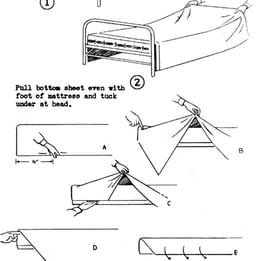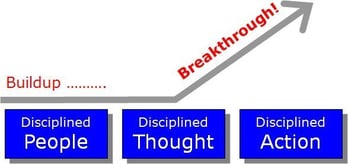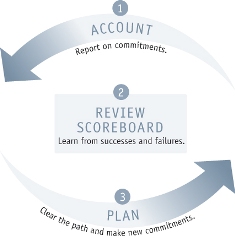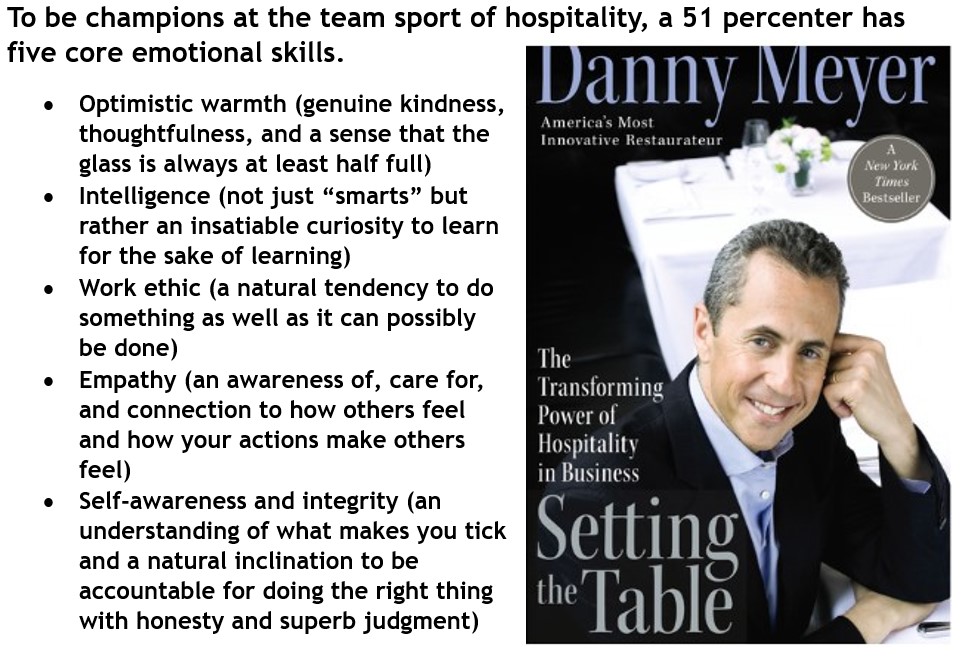How do you develop standards of excellence?
Last week, Danny Meyer’s story Managing Your Team - Where Should Your Saltshaker Be shared his angst and discovery on how to establish standards of excellence.
When I became general manager of my first radio station in Wausau, Wisconsin I wanted to achieve higher standards. My idea for this came from Joe Sugarman’s Success Forces. Joe Sugarman is known throughout the advertising world as a copywriting legend and role model, best known for selling 20 million Blu-Blocker Sunglasses.
I’ve written several blogs about him including Success Forces, Success Forces Continued, and Tuck Your Shirt In.
Establish Standards
Why does the Army require barracks to have clean floors, mattresses you can bounce a quarter off, or shoes shined so well you can see your face?
It’s to develop discipline. Teaching troops to take care of minor things inoculates their mindset. They take care of things that matter, even when not being directly supervised.
Joe Sugarman’s Success Forces revealed this hidden meaning. By announcing what you intend to inspect, you discover their respect for it, and YOU. If they know what is going to be inspected and they fail to follow through, then you know other rules are not being followed as well. That’s why the entire barracks is punished when the rule isn’t followed.
 As Jim Collins shares Disciplined People, Disciplined Thought, and Disciplined Action lead a company from Good to Great.
As Jim Collins shares Disciplined People, Disciplined Thought, and Disciplined Action lead a company from Good to Great.
Clean Your Desk
Several years ago, I connected with one of my former employees. She’s semi-retired now. Cindy was our best salesperson, eventually became Sales Manager, General Manager of the station, and finally started her own ad agency. I spoke to her shortly after she had just sold it.
Her first words to me were, Doug I still follow your rule, clean your desk every day!
 The Clean Your Desk Rule required everyone to clean off their desk at the end of the day. The limit was 3 items, one of which included their phone. (This was before cell phones.) This meant they could only have two items on their desk. I did allow them to put items on their chair, provided they slid their chair under their desk.
The Clean Your Desk Rule required everyone to clean off their desk at the end of the day. The limit was 3 items, one of which included their phone. (This was before cell phones.) This meant they could only have two items on their desk. I did allow them to put items on their chair, provided they slid their chair under their desk.
On the surface, it may have appeared to make the office look neat and tidy. It was a benefit from this standard.
There was an additional metaphysical benefit.
On one specific occasion, I recall Cindy failing to return to the radio station from the day before. I usually was the first one in each morning, so I noticed her desk was strewn with papers when I came in.
When Cindy arrived that morning, I visited her desk and asked how she was doing. She quickly responded fine. I probed a bit deeper. “Is everything okay?” She proceeded to tell me of challenges she had faced the previous day with some customers, then one of her sons, and finally a decision she was trying to make to return to Idaho to attempt to patch up her relationship with her ex-husband.
All this bubbled up from her from just one simple question. A question prompted by her not cleaning her desk the night before.
I can’t tell you how many times I learned about things my team was going through because of my “clean your desk” rule. It was priceless. I developed empathy for my people, they discovered how much I cared about them, plus morale was always high.
When I left Cindy’s desk, I simply said, “noticed you didn’t clean your desk last night, can you make sure you do tonight?” She instantly told me why, sharing she hadn’t had time to come back to the office. I’m not sure she realized my only reason for asking her how she was that morning was because I’d noticed her desk. Perhaps her answer 30 years later revealed she did understand the value of this rule.
.jpg?width=923&height=525&name=Joe%20Sugarmans%20Success%20Forces%20(7).jpg) Behavior Rules
Behavior Rules
Is it silly to set performance rules like this?
The smallest details I believe have the power to magnify results. Professional sports teams at all levels win due to minor things done extremely well. It’s the same in business.
Discipline is the hallmark of any successful enterprise.
My clean desk rule helped me to discover who was struggling and who wasn’t. What behavior rules can you establish to elevate your team’s performance?
Remember, Behavior Never Lies!
I’ll leave you today with One Minute by Joe Sugarman's "The Psychological Triggers of Success"
To create an environment where everyone is inspired to give their best, contact Positioning Systems today to schedule a free exploratory meeting.
Growth demands Strategic Discipline.
 How do you hire at your business? Do you have a unique focus that helps you determine the right people for your organization? If you believe in First Who, then What, you’ll learn something about hiring from Danny Meyer’s 49% Task, 51% Feeling - Hiring Rule, and his Moth Story. We’ll share these insights in our next blog.
How do you hire at your business? Do you have a unique focus that helps you determine the right people for your organization? If you believe in First Who, then What, you’ll learn something about hiring from Danny Meyer’s 49% Task, 51% Feeling - Hiring Rule, and his Moth Story. We’ll share these insights in our next blog.
Building an enduring great organization requires disciplined people, disciplined thought, disciplined action, superior results, producing a distinctive impact on the world.
 Discipline sustains momentum, over a long period of time, laying the foundations for lasting endurance.
Discipline sustains momentum, over a long period of time, laying the foundations for lasting endurance.
A winning habit starts with 3 Strategic Disciplines: Priority, Metrics, and Meeting Rhythms. Forecasting, accountability, individual, and team performance improve dramatically.
Meeting Rhythms achieve a disciplined focus on performance metrics to drive growth.
Let Positioning Systems help your business achieve these outcomes on the Four most Important Decisions your business faces:
|
DECISION |
RESULT/OUTCOME |
|
PEOPLE |
|
|
STRATEGY |
|
|
EXECUTION |
|
|
CASH |
|
Positioning Systems helps mid-sized ($5M - $500M+) businesses Scale-UP. We align your business to focus on Your One Thing! Contact dwick@positioningsystems.com to Scale Up your business! Take our Four Decisions Needs Assessment to discover how your business measures against other Scaled Up companies. We’ll contact you.
NEXT BLOG – Danny Meyer’s 49% Task, 51% Feeling - Hiring Rule – Moth Story






.jpeg?width=150&height=135&name=Hand%20with%20marker%20writing%20the%20question%20Whats%20Next_%20(1).jpeg)

